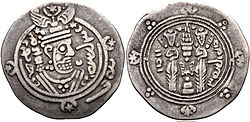Khurshid of Tabaristan
| Khurshid | |
|---|---|
| Ispahbadh of Tabaristan | |

Silver dirham issued by Khurshid
|
|
| Reign | 740–760 |
| Predecessor | Dadmihr |
| Successor | Abbasid conquest |
| Regent | Farrukhan the Little |
| Born | 734 Sari |
| Died | 761 (aged 26–27) Palam, Daylam |
| Consort | Varmja Haraviya |
| House | Dabuyid dynasty |
| Father | Dadmihr |
| Religion | Zoroastrianism |
Khurshid (Middle Persian: ![]() , Khōrshēd; Tabari/Persian: اسپهبد خورشید, Spāhbed Khōrshīd 'General Khorshid'; 734–761), erroneously designated Khurshid II by earlier scholars, was the last Dabuyid ispahbadh of Tabaristan. He succeeded to the throne at an early age, and was supervised by his uncle as regent until he reached the age of fourteen. Khurshid tried to assert his independence from his vassalage to the Caliphate, supported various rebellions and maintained diplomatic contacts with Tang China. Finally, the Abbasids conquered his country in 759–760, and captured most members of his family. Khurshid fled to Daylam, where he ended his life.
, Khōrshēd; Tabari/Persian: اسپهبد خورشید, Spāhbed Khōrshīd 'General Khorshid'; 734–761), erroneously designated Khurshid II by earlier scholars, was the last Dabuyid ispahbadh of Tabaristan. He succeeded to the throne at an early age, and was supervised by his uncle as regent until he reached the age of fourteen. Khurshid tried to assert his independence from his vassalage to the Caliphate, supported various rebellions and maintained diplomatic contacts with Tang China. Finally, the Abbasids conquered his country in 759–760, and captured most members of his family. Khurshid fled to Daylam, where he ended his life.
Khurshid was born in 734/735, the son of Dadhburzmihr or Dadmihr (died 740) and grandson of Farrukhan the Great (died ca. 728), the first ruler (ispahbadh) of the Dabuyid dynasty from whose reign coins are known. According to the traditional account, the Dabuyids had established themselves as the quasi-independent rulers of Tabaristan in the 640s, during the tumults of the Muslim conquest of Persia and the collapse of the Sassanid Empire. They owed only the payment tribute and nominal vassalage to the Arab Caliphate, and managed, despite repeated Muslim attempts at invasion, to maintain their autonomy by exploiting the inaccessible terrain of their country. A more recent interpretation of the sources by P. Pourshariati, however, supports that Farrukhan was the one who actually established the family's rule over Tabaristan, sometime in the 670s. In earlier works on the dynasty, Khurshid is named Khurshid II, due to erroneous interpretation of numismatic evidence, which led earlier scholars to interpolate a first Khurshid before Farrukhan, whose rule was thought to have begun ca. 710.
...
Wikipedia
